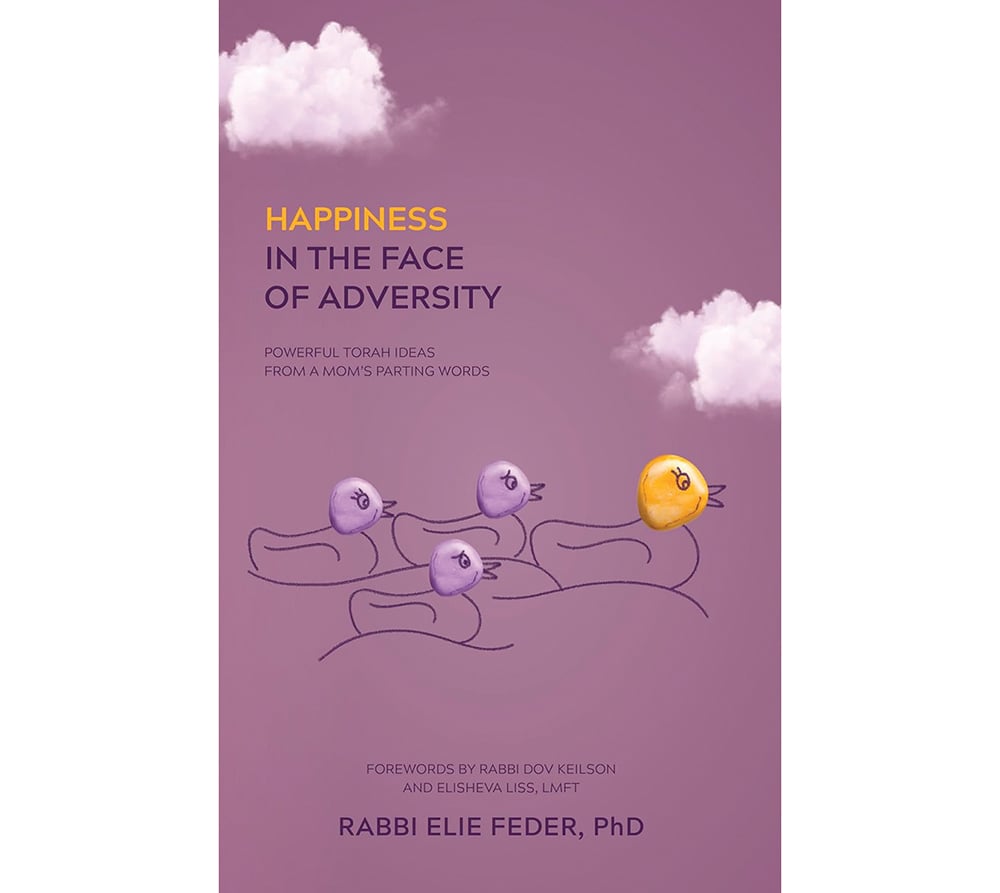
Reviewing: “Happiness in the Face of Adversity: Powerful Torah Ideas From a Mom’s Parting Words” by Rabbi Elie Feder. Mosaica Press. 2024. 196 pages. ISBN-10: 1961602679.
For those looking for a sefer that encapsulates the authentic machshava of our baalei mesorah, who are looking for it to be presented in an engaging and personal way, and to be provided with actionable steps on how to incorporate the valuable lessons of our sages, then one will be interested in Happiness in the Face of Adversity by Rabbi Elie Feder. Some readers may be familiar with the author’s previous, groundbreaking sefer on Gematria. In it, as the Minchas Asher pointed out, he developed an approach to understanding the strange methods of Gematria that are found in our rabbinic commentaries. Likewise in this publication, the author presents profound ideas in accessible ways.
Rabbi Feder, the consummate talmid chacham that he is, provides the reader with various ideas that are found in the Gemara, Rishonim and Achronim, and elucidates complicated concepts with rigorous analysis while penetrating the depths of their statements. However, the author has the ability to do so in a very presentable and accessible manner, really doing all the heavy lifting for the reader and providing a glimpse of his genius.
The author goes through different topics, and shares not only explanations of the ideas, but also why they are presented by Chazal in the ways they are; he provides reasons for their methods. He explains why a Mishna is written in such a seemingly confusing way, or sheds light on what a comment of the Rambam is addressing and specifically what it is not speaking about, or how an insight of Ibn Ezra seems counterintuitive, but really expresses something very different.
Such important and complicated issues that are presented, and thoroughly explained in this sefer, include how a person could possibly reach the mandate to say Baruch Dayan Ha’emes with happiness; how it is remotely feasible to see things as being for the good when they seem so terrible; how a person could achieve the feat of not coveting what others have when it seems like they are lacking so much; how a person can love his neighbor truly like he loves himself; how one could, accurately, judge others favorably; and many more puzzling statements of our rabbis.
Rabbi Feder starts this sefer off with a letter from his mother, Shani Feder, of blessed memory, who shared words of parting wisdom with her family shortly before her untimely passing. Rabbi Feder shares a very raw and personal memory with the public, and presents the audience with a guided narrative through the words of our Sages to provide insight for all, not just those who knew the wonderful woman that was Shani Feder. Each chapter begins with a short quotation from this letter, which is magnificent in its own right, and then the author provides thought provoking questions and develops a thought process through the words of our rabbis in trying to confront very difficult challenges in life and responding in ways that would allow us to achieve levels of happiness.
The author’s mother, unfortunately, experienced many health problems in her life, but always presented a smile and would not stop caring for and helping others, even though it was evident (to only her and her husband) that she was the one who should have been helped and cared for. She presented as such an authentically happy and grateful individual, that the author, her son, and all who knew her had no choice but to believe that she sincerely felt this way. It was puzzling how a woman who had gone through dozens of surgeries and tremendous illness could write:
I am awed by watching the miraculous order of God’s nature unfolding in my backyard – you can see throughout nature, a mother’s job is to give her child wings, teach them to fly, and watch them soar….Enjoy and cherish every day…if you focus your worry on tomorrow, it makes you lose today and tomorrow….Always thank God for all the good that you have (and for the bad that you don’t have)….Bumps in the road are just that and make me appreciate what I have more. (pages 10-11)
The author plumbed the depths of our baalei machshava to see how this could be the case, which allowed him to understand particularly clever and helpful insights she provided her family, which he shares with us.
We, the readers, have the opportunity to benefit from this clearly special individual who lived a life of splendor. The author provides us opportunities to be able to experience some of that magic that pervaded her life. What is particularly unique is that the author, who has served as a rebbe and educator for many years, provides very concrete and actionable steps at the end of each chapter to allow the reader to take home and apply these rather innovative ideas of the Sages, giving us the ability to impact our lives in very specific ways. Although there is high level theory in this work, much direct guidance is given to each and every one of us who shares in the author’s journey.
This sefer has much to offer a novice in Torah knowledge and also a tremendous amount to someone well versed in the statements of our Sages; it shares research from top psychologists, and provides great advice for people looking to enhance their lives. It is a must read.
Rabbi Eliezer Barany is an editor and serves as a Middle School rebbe at Katz Hillel Day School in south Florida.









